Organisational Behaviour Analysis
VerifiedAdded on 2020/10/22
|15
|5085
|413
Report
AI Summary
This report analyzes the influence of culture, politics, and power on individual and team behaviour within an organisation, specifically focusing on 4com plc. It evaluates motivational theories and their application in achieving organisational goals, discusses the characteristics of effective teams, and applies concepts of organisational behaviour to enhance performance. The report concludes with insights on how these factors can positively or negatively impact workplace dynamics.
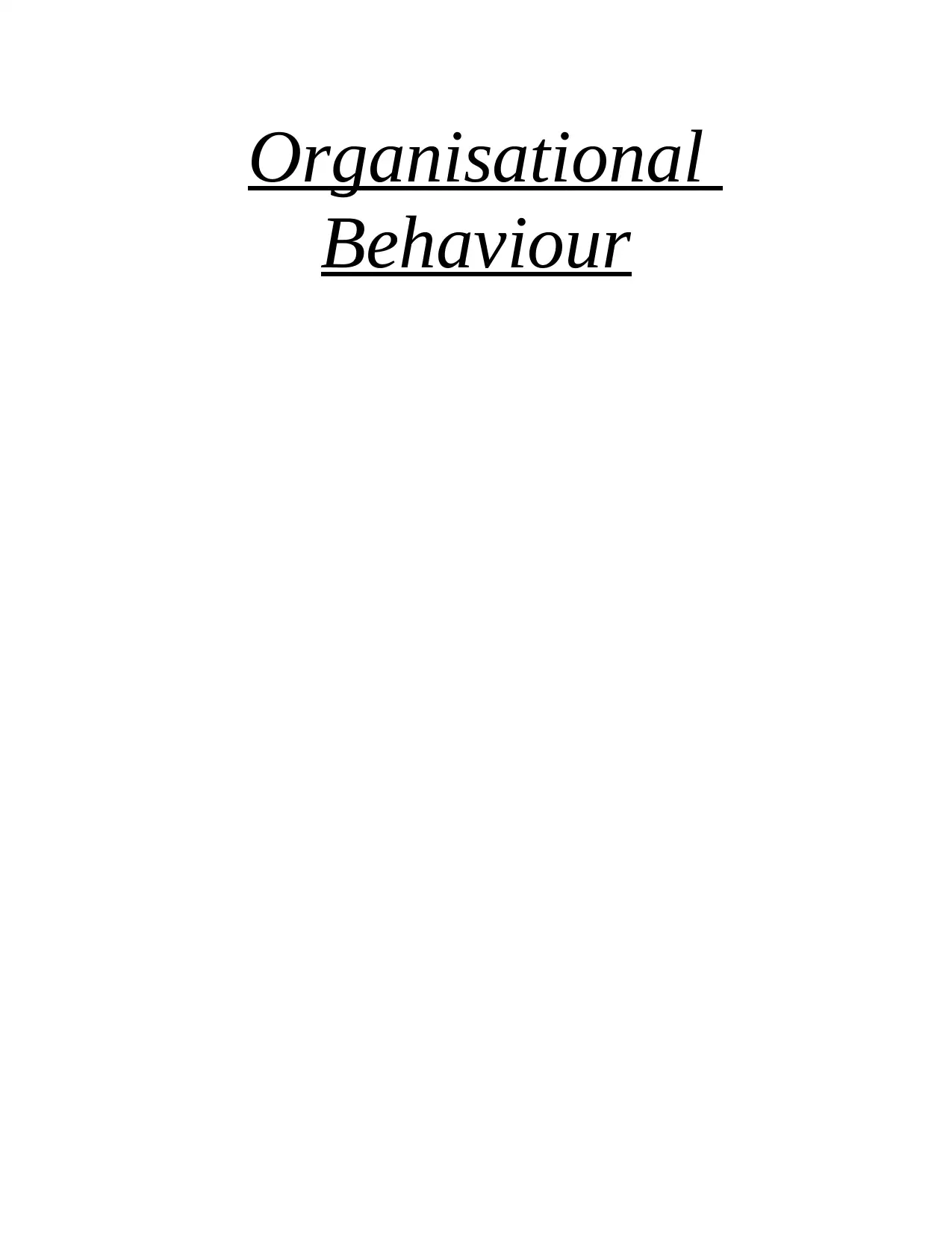
Organisational
Behaviour
Behaviour
Paraphrase This Document
Need a fresh take? Get an instant paraphrase of this document with our AI Paraphraser
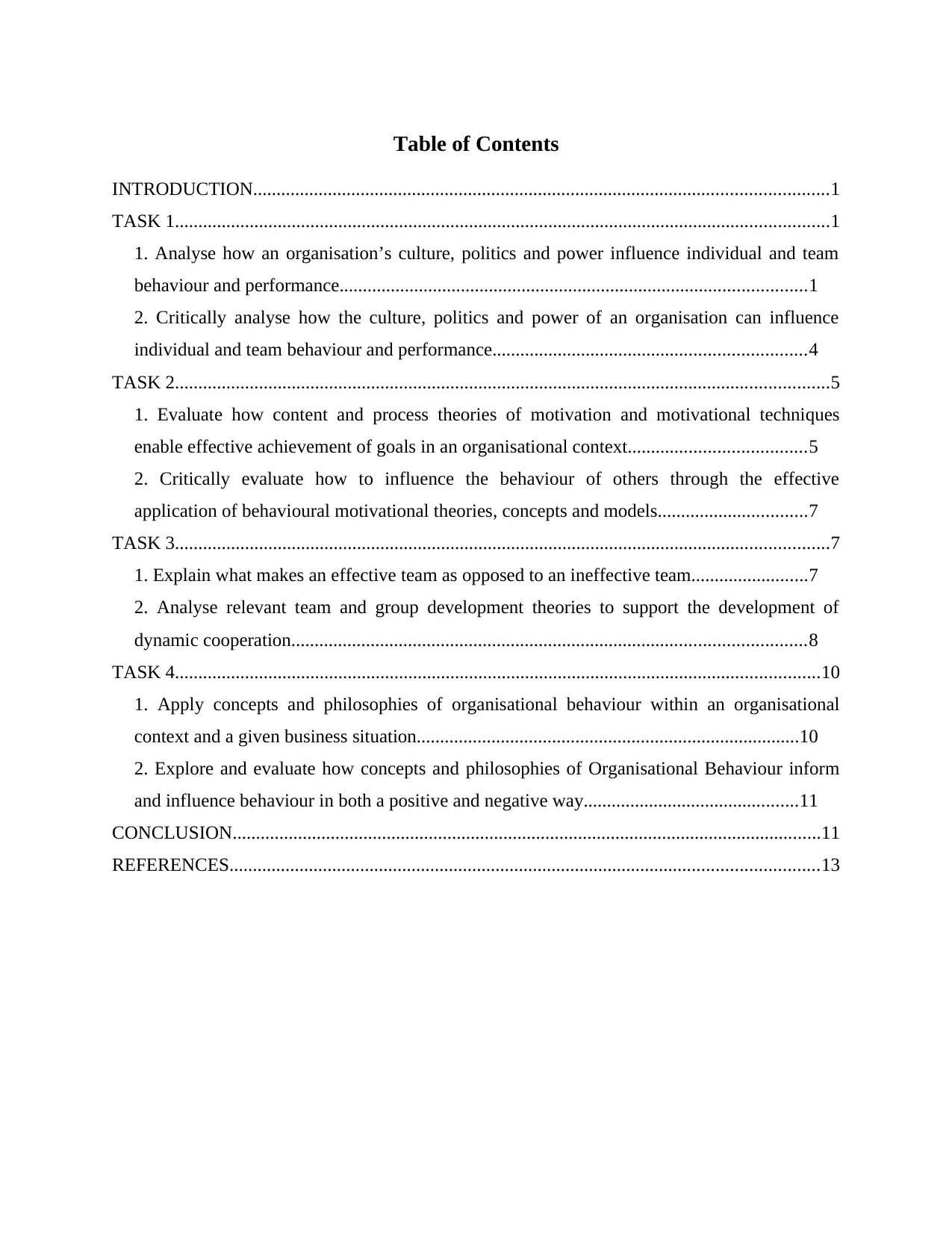
Table of Contents
INTRODUCTION...........................................................................................................................1
TASK 1............................................................................................................................................1
1. Analyse how an organisation’s culture, politics and power influence individual and team
behaviour and performance....................................................................................................1
2. Critically analyse how the culture, politics and power of an organisation can influence
individual and team behaviour and performance...................................................................4
TASK 2............................................................................................................................................5
1. Evaluate how content and process theories of motivation and motivational techniques
enable effective achievement of goals in an organisational context......................................5
2. Critically evaluate how to influence the behaviour of others through the effective
application of behavioural motivational theories, concepts and models................................7
TASK 3............................................................................................................................................7
1. Explain what makes an effective team as opposed to an ineffective team.........................7
2. Analyse relevant team and group development theories to support the development of
dynamic cooperation..............................................................................................................8
TASK 4..........................................................................................................................................10
1. Apply concepts and philosophies of organisational behaviour within an organisational
context and a given business situation..................................................................................10
2. Explore and evaluate how concepts and philosophies of Organisational Behaviour inform
and influence behaviour in both a positive and negative way..............................................11
CONCLUSION..............................................................................................................................11
REFERENCES..............................................................................................................................13
INTRODUCTION...........................................................................................................................1
TASK 1............................................................................................................................................1
1. Analyse how an organisation’s culture, politics and power influence individual and team
behaviour and performance....................................................................................................1
2. Critically analyse how the culture, politics and power of an organisation can influence
individual and team behaviour and performance...................................................................4
TASK 2............................................................................................................................................5
1. Evaluate how content and process theories of motivation and motivational techniques
enable effective achievement of goals in an organisational context......................................5
2. Critically evaluate how to influence the behaviour of others through the effective
application of behavioural motivational theories, concepts and models................................7
TASK 3............................................................................................................................................7
1. Explain what makes an effective team as opposed to an ineffective team.........................7
2. Analyse relevant team and group development theories to support the development of
dynamic cooperation..............................................................................................................8
TASK 4..........................................................................................................................................10
1. Apply concepts and philosophies of organisational behaviour within an organisational
context and a given business situation..................................................................................10
2. Explore and evaluate how concepts and philosophies of Organisational Behaviour inform
and influence behaviour in both a positive and negative way..............................................11
CONCLUSION..............................................................................................................................11
REFERENCES..............................................................................................................................13
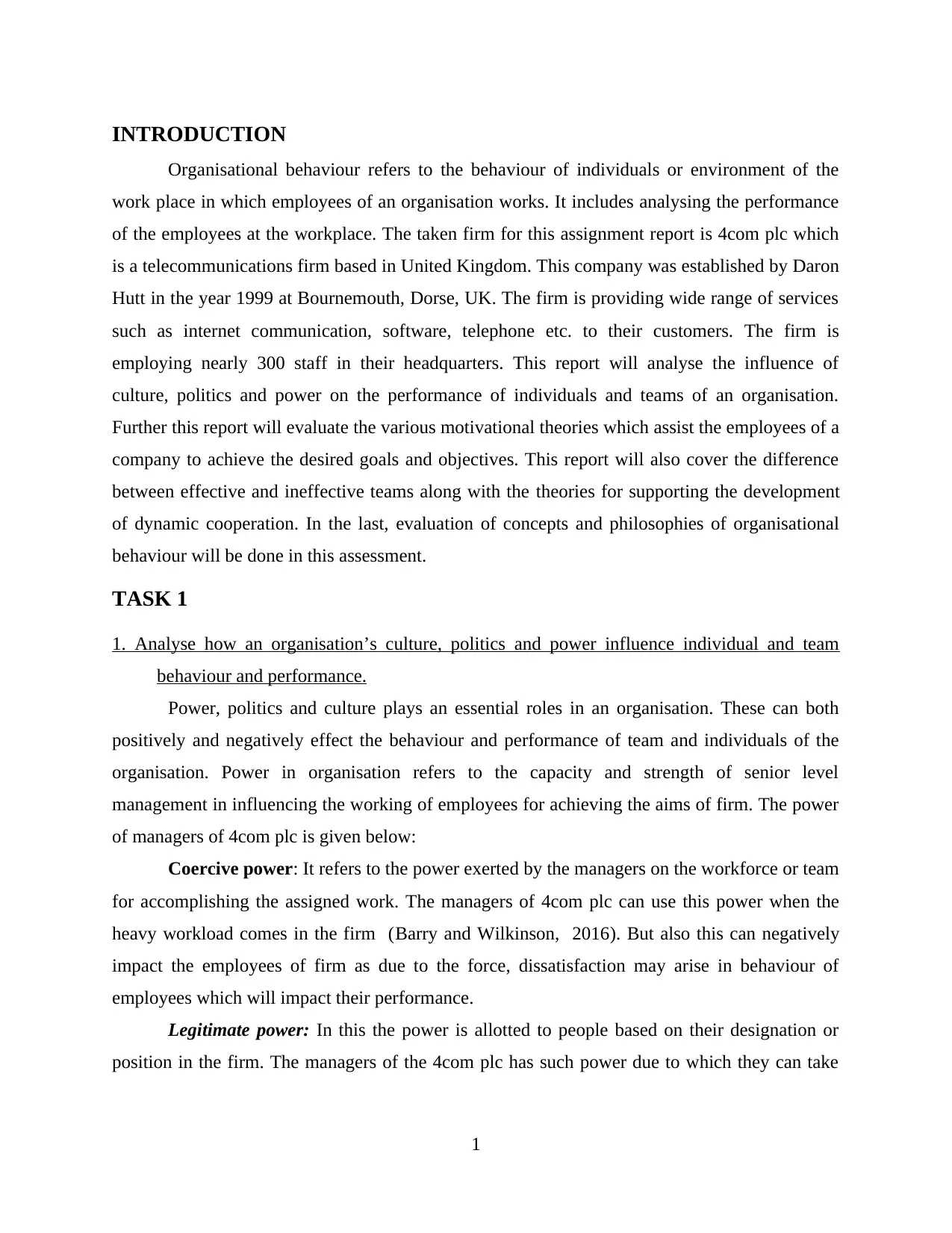
INTRODUCTION
Organisational behaviour refers to the behaviour of individuals or environment of the
work place in which employees of an organisation works. It includes analysing the performance
of the employees at the workplace. The taken firm for this assignment report is 4com plc which
is a telecommunications firm based in United Kingdom. This company was established by Daron
Hutt in the year 1999 at Bournemouth, Dorse, UK. The firm is providing wide range of services
such as internet communication, software, telephone etc. to their customers. The firm is
employing nearly 300 staff in their headquarters. This report will analyse the influence of
culture, politics and power on the performance of individuals and teams of an organisation.
Further this report will evaluate the various motivational theories which assist the employees of a
company to achieve the desired goals and objectives. This report will also cover the difference
between effective and ineffective teams along with the theories for supporting the development
of dynamic cooperation. In the last, evaluation of concepts and philosophies of organisational
behaviour will be done in this assessment.
TASK 1
1. Analyse how an organisation’s culture, politics and power influence individual and team
behaviour and performance.
Power, politics and culture plays an essential roles in an organisation. These can both
positively and negatively effect the behaviour and performance of team and individuals of the
organisation. Power in organisation refers to the capacity and strength of senior level
management in influencing the working of employees for achieving the aims of firm. The power
of managers of 4com plc is given below:
Coercive power: It refers to the power exerted by the managers on the workforce or team
for accomplishing the assigned work. The managers of 4com plc can use this power when the
heavy workload comes in the firm (Barry and Wilkinson, 2016). But also this can negatively
impact the employees of firm as due to the force, dissatisfaction may arise in behaviour of
employees which will impact their performance.
Legitimate power: In this the power is allotted to people based on their designation or
position in the firm. The managers of the 4com plc has such power due to which they can take
1
Organisational behaviour refers to the behaviour of individuals or environment of the
work place in which employees of an organisation works. It includes analysing the performance
of the employees at the workplace. The taken firm for this assignment report is 4com plc which
is a telecommunications firm based in United Kingdom. This company was established by Daron
Hutt in the year 1999 at Bournemouth, Dorse, UK. The firm is providing wide range of services
such as internet communication, software, telephone etc. to their customers. The firm is
employing nearly 300 staff in their headquarters. This report will analyse the influence of
culture, politics and power on the performance of individuals and teams of an organisation.
Further this report will evaluate the various motivational theories which assist the employees of a
company to achieve the desired goals and objectives. This report will also cover the difference
between effective and ineffective teams along with the theories for supporting the development
of dynamic cooperation. In the last, evaluation of concepts and philosophies of organisational
behaviour will be done in this assessment.
TASK 1
1. Analyse how an organisation’s culture, politics and power influence individual and team
behaviour and performance.
Power, politics and culture plays an essential roles in an organisation. These can both
positively and negatively effect the behaviour and performance of team and individuals of the
organisation. Power in organisation refers to the capacity and strength of senior level
management in influencing the working of employees for achieving the aims of firm. The power
of managers of 4com plc is given below:
Coercive power: It refers to the power exerted by the managers on the workforce or team
for accomplishing the assigned work. The managers of 4com plc can use this power when the
heavy workload comes in the firm (Barry and Wilkinson, 2016). But also this can negatively
impact the employees of firm as due to the force, dissatisfaction may arise in behaviour of
employees which will impact their performance.
Legitimate power: In this the power is allotted to people based on their designation or
position in the firm. The managers of the 4com plc has such power due to which they can take
1
⊘ This is a preview!⊘
Do you want full access?
Subscribe today to unlock all pages.

Trusted by 1+ million students worldwide
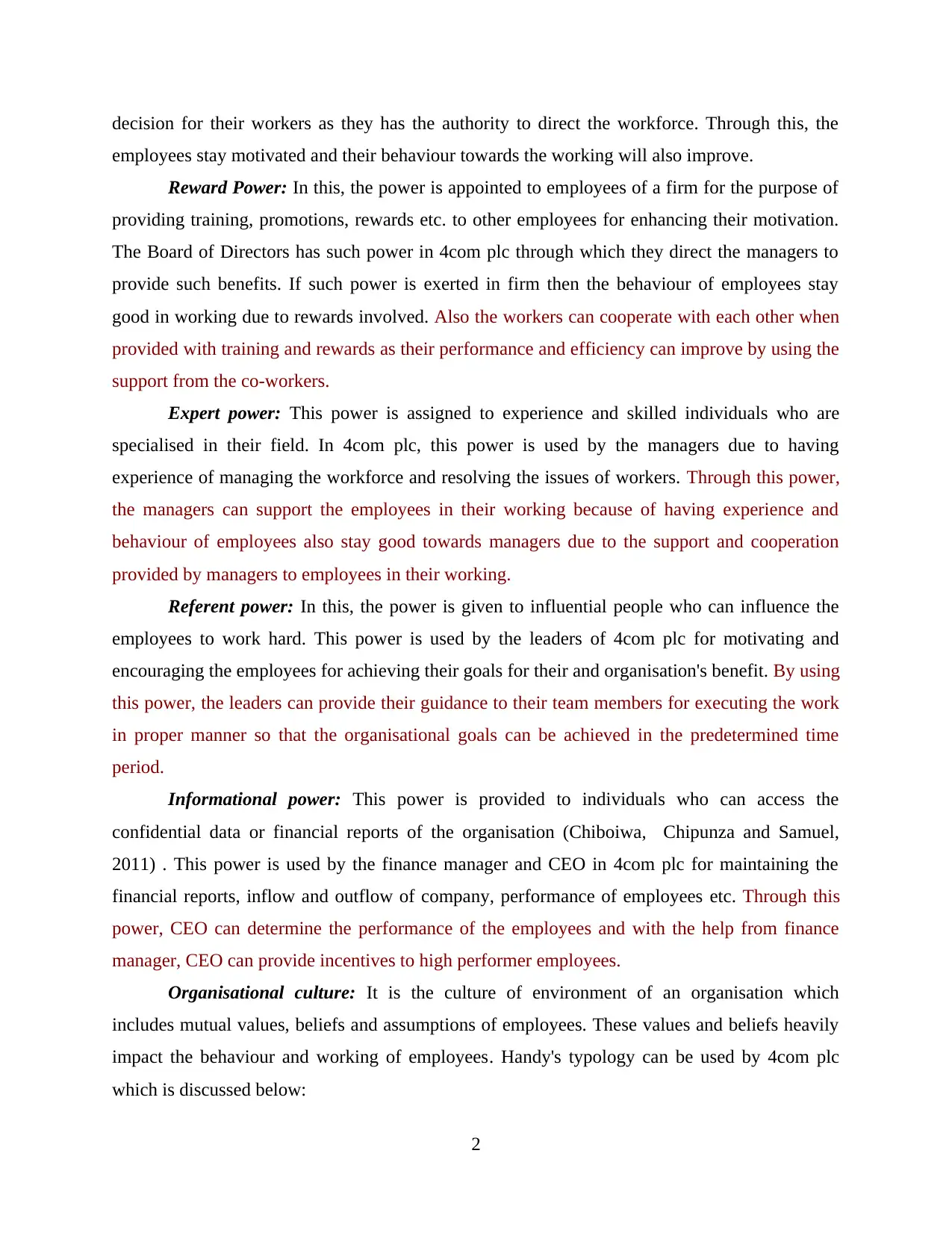
decision for their workers as they has the authority to direct the workforce. Through this, the
employees stay motivated and their behaviour towards the working will also improve.
Reward Power: In this, the power is appointed to employees of a firm for the purpose of
providing training, promotions, rewards etc. to other employees for enhancing their motivation.
The Board of Directors has such power in 4com plc through which they direct the managers to
provide such benefits. If such power is exerted in firm then the behaviour of employees stay
good in working due to rewards involved. Also the workers can cooperate with each other when
provided with training and rewards as their performance and efficiency can improve by using the
support from the co-workers.
Expert power: This power is assigned to experience and skilled individuals who are
specialised in their field. In 4com plc, this power is used by the managers due to having
experience of managing the workforce and resolving the issues of workers. Through this power,
the managers can support the employees in their working because of having experience and
behaviour of employees also stay good towards managers due to the support and cooperation
provided by managers to employees in their working.
Referent power: In this, the power is given to influential people who can influence the
employees to work hard. This power is used by the leaders of 4com plc for motivating and
encouraging the employees for achieving their goals for their and organisation's benefit. By using
this power, the leaders can provide their guidance to their team members for executing the work
in proper manner so that the organisational goals can be achieved in the predetermined time
period.
Informational power: This power is provided to individuals who can access the
confidential data or financial reports of the organisation (Chiboiwa, Chipunza and Samuel,
2011) . This power is used by the finance manager and CEO in 4com plc for maintaining the
financial reports, inflow and outflow of company, performance of employees etc. Through this
power, CEO can determine the performance of the employees and with the help from finance
manager, CEO can provide incentives to high performer employees.
Organisational culture: It is the culture of environment of an organisation which
includes mutual values, beliefs and assumptions of employees. These values and beliefs heavily
impact the behaviour and working of employees. Handy's typology can be used by 4com plc
which is discussed below:
2
employees stay motivated and their behaviour towards the working will also improve.
Reward Power: In this, the power is appointed to employees of a firm for the purpose of
providing training, promotions, rewards etc. to other employees for enhancing their motivation.
The Board of Directors has such power in 4com plc through which they direct the managers to
provide such benefits. If such power is exerted in firm then the behaviour of employees stay
good in working due to rewards involved. Also the workers can cooperate with each other when
provided with training and rewards as their performance and efficiency can improve by using the
support from the co-workers.
Expert power: This power is assigned to experience and skilled individuals who are
specialised in their field. In 4com plc, this power is used by the managers due to having
experience of managing the workforce and resolving the issues of workers. Through this power,
the managers can support the employees in their working because of having experience and
behaviour of employees also stay good towards managers due to the support and cooperation
provided by managers to employees in their working.
Referent power: In this, the power is given to influential people who can influence the
employees to work hard. This power is used by the leaders of 4com plc for motivating and
encouraging the employees for achieving their goals for their and organisation's benefit. By using
this power, the leaders can provide their guidance to their team members for executing the work
in proper manner so that the organisational goals can be achieved in the predetermined time
period.
Informational power: This power is provided to individuals who can access the
confidential data or financial reports of the organisation (Chiboiwa, Chipunza and Samuel,
2011) . This power is used by the finance manager and CEO in 4com plc for maintaining the
financial reports, inflow and outflow of company, performance of employees etc. Through this
power, CEO can determine the performance of the employees and with the help from finance
manager, CEO can provide incentives to high performer employees.
Organisational culture: It is the culture of environment of an organisation which
includes mutual values, beliefs and assumptions of employees. These values and beliefs heavily
impact the behaviour and working of employees. Handy's typology can be used by 4com plc
which is discussed below:
2
Paraphrase This Document
Need a fresh take? Get an instant paraphrase of this document with our AI Paraphraser
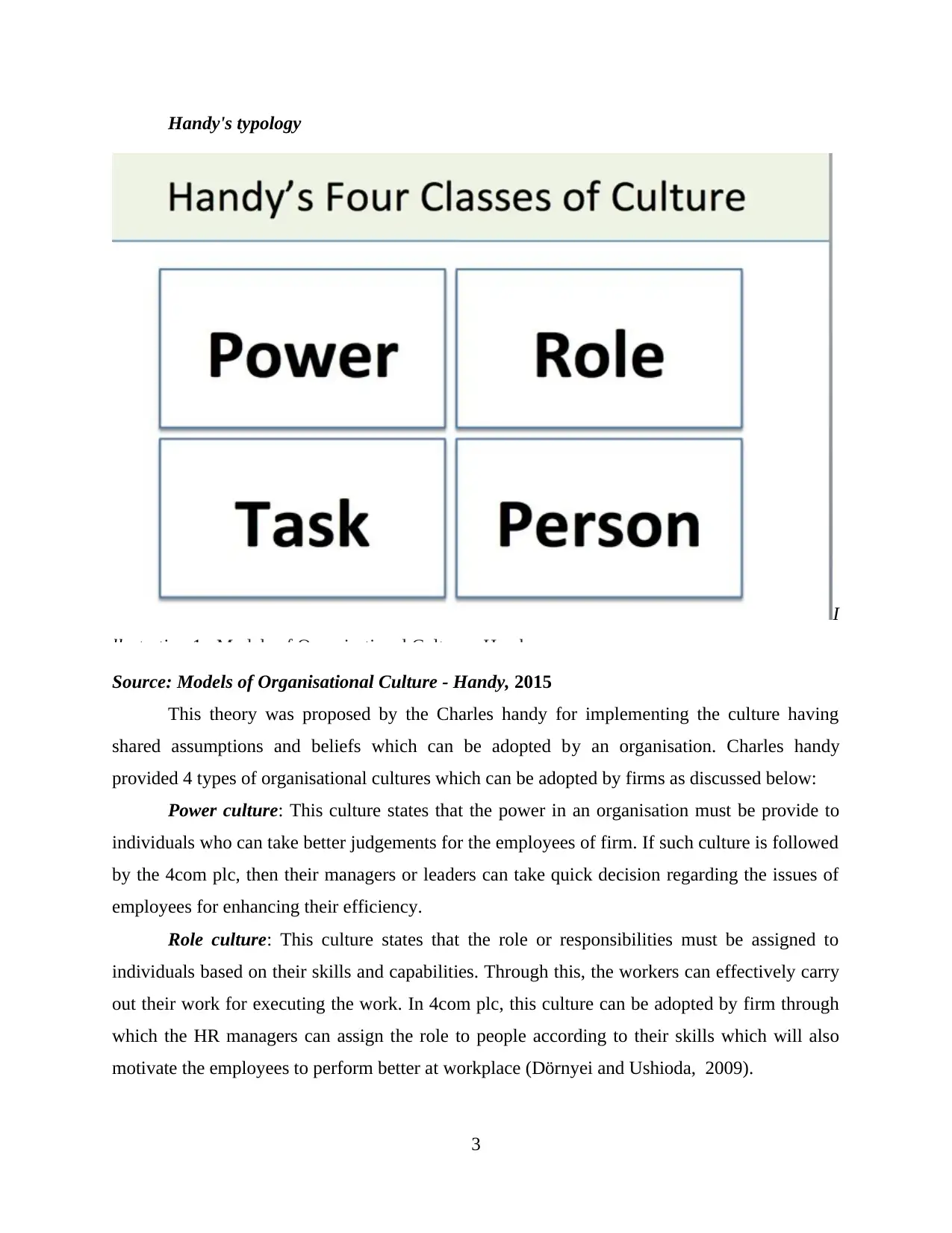
Handy's typology
I
llustration 1: Models of Organisational Culture - Handy
Source: Models of Organisational Culture - Handy, 2015
This theory was proposed by the Charles handy for implementing the culture having
shared assumptions and beliefs which can be adopted by an organisation. Charles handy
provided 4 types of organisational cultures which can be adopted by firms as discussed below:
Power culture: This culture states that the power in an organisation must be provide to
individuals who can take better judgements for the employees of firm. If such culture is followed
by the 4com plc, then their managers or leaders can take quick decision regarding the issues of
employees for enhancing their efficiency.
Role culture: This culture states that the role or responsibilities must be assigned to
individuals based on their skills and capabilities. Through this, the workers can effectively carry
out their work for executing the work. In 4com plc, this culture can be adopted by firm through
which the HR managers can assign the role to people according to their skills which will also
motivate the employees to perform better at workplace (Dörnyei and Ushioda, 2009).
3
I
llustration 1: Models of Organisational Culture - Handy
Source: Models of Organisational Culture - Handy, 2015
This theory was proposed by the Charles handy for implementing the culture having
shared assumptions and beliefs which can be adopted by an organisation. Charles handy
provided 4 types of organisational cultures which can be adopted by firms as discussed below:
Power culture: This culture states that the power in an organisation must be provide to
individuals who can take better judgements for the employees of firm. If such culture is followed
by the 4com plc, then their managers or leaders can take quick decision regarding the issues of
employees for enhancing their efficiency.
Role culture: This culture states that the role or responsibilities must be assigned to
individuals based on their skills and capabilities. Through this, the workers can effectively carry
out their work for executing the work. In 4com plc, this culture can be adopted by firm through
which the HR managers can assign the role to people according to their skills which will also
motivate the employees to perform better at workplace (Dörnyei and Ushioda, 2009).
3
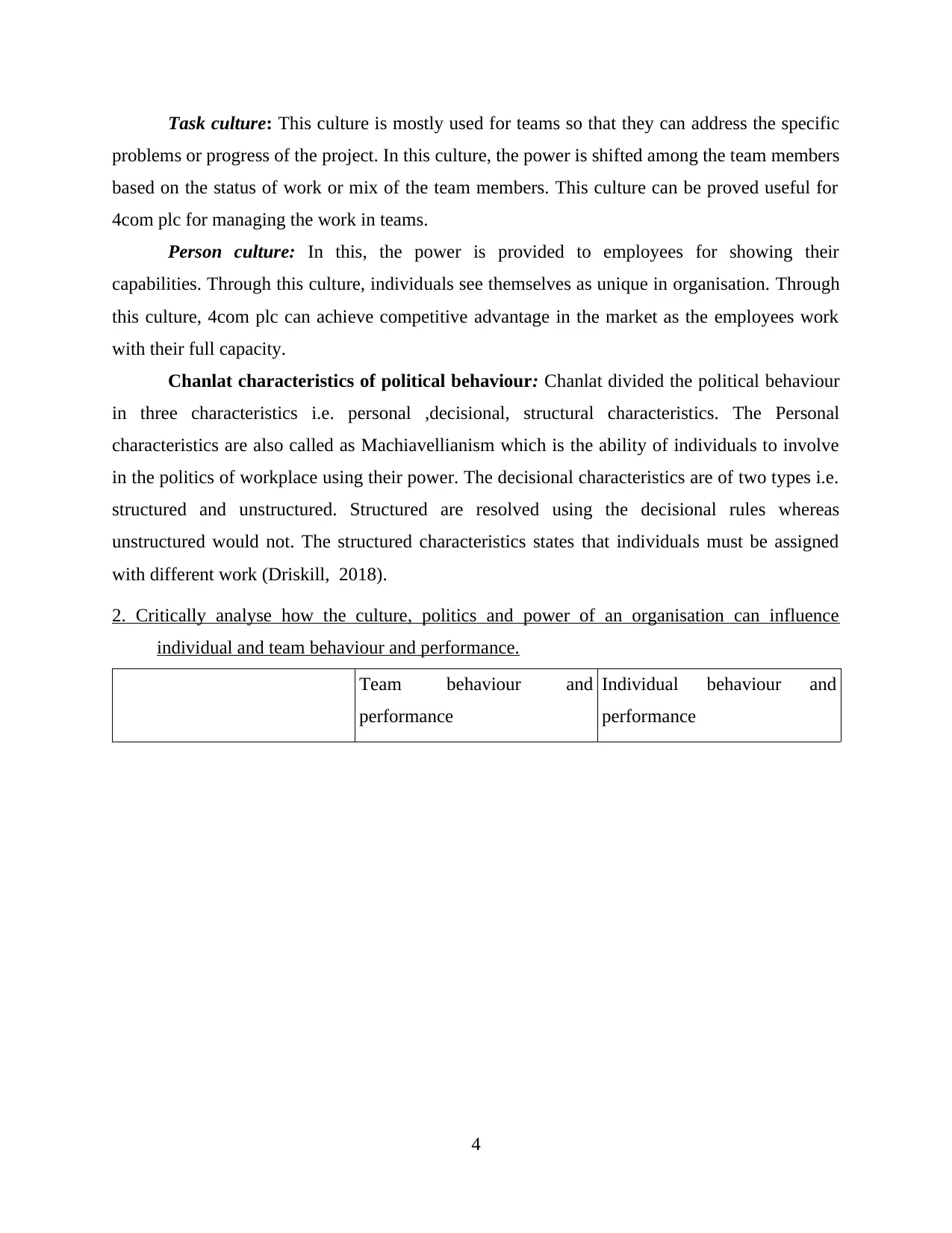
Task culture: This culture is mostly used for teams so that they can address the specific
problems or progress of the project. In this culture, the power is shifted among the team members
based on the status of work or mix of the team members. This culture can be proved useful for
4com plc for managing the work in teams.
Person culture: In this, the power is provided to employees for showing their
capabilities. Through this culture, individuals see themselves as unique in organisation. Through
this culture, 4com plc can achieve competitive advantage in the market as the employees work
with their full capacity.
Chanlat characteristics of political behaviour: Chanlat divided the political behaviour
in three characteristics i.e. personal ,decisional, structural characteristics. The Personal
characteristics are also called as Machiavellianism which is the ability of individuals to involve
in the politics of workplace using their power. The decisional characteristics are of two types i.e.
structured and unstructured. Structured are resolved using the decisional rules whereas
unstructured would not. The structured characteristics states that individuals must be assigned
with different work (Driskill, 2018).
2. Critically analyse how the culture, politics and power of an organisation can influence
individual and team behaviour and performance.
Team behaviour and
performance
Individual behaviour and
performance
4
problems or progress of the project. In this culture, the power is shifted among the team members
based on the status of work or mix of the team members. This culture can be proved useful for
4com plc for managing the work in teams.
Person culture: In this, the power is provided to employees for showing their
capabilities. Through this culture, individuals see themselves as unique in organisation. Through
this culture, 4com plc can achieve competitive advantage in the market as the employees work
with their full capacity.
Chanlat characteristics of political behaviour: Chanlat divided the political behaviour
in three characteristics i.e. personal ,decisional, structural characteristics. The Personal
characteristics are also called as Machiavellianism which is the ability of individuals to involve
in the politics of workplace using their power. The decisional characteristics are of two types i.e.
structured and unstructured. Structured are resolved using the decisional rules whereas
unstructured would not. The structured characteristics states that individuals must be assigned
with different work (Driskill, 2018).
2. Critically analyse how the culture, politics and power of an organisation can influence
individual and team behaviour and performance.
Team behaviour and
performance
Individual behaviour and
performance
4
⊘ This is a preview!⊘
Do you want full access?
Subscribe today to unlock all pages.

Trusted by 1+ million students worldwide
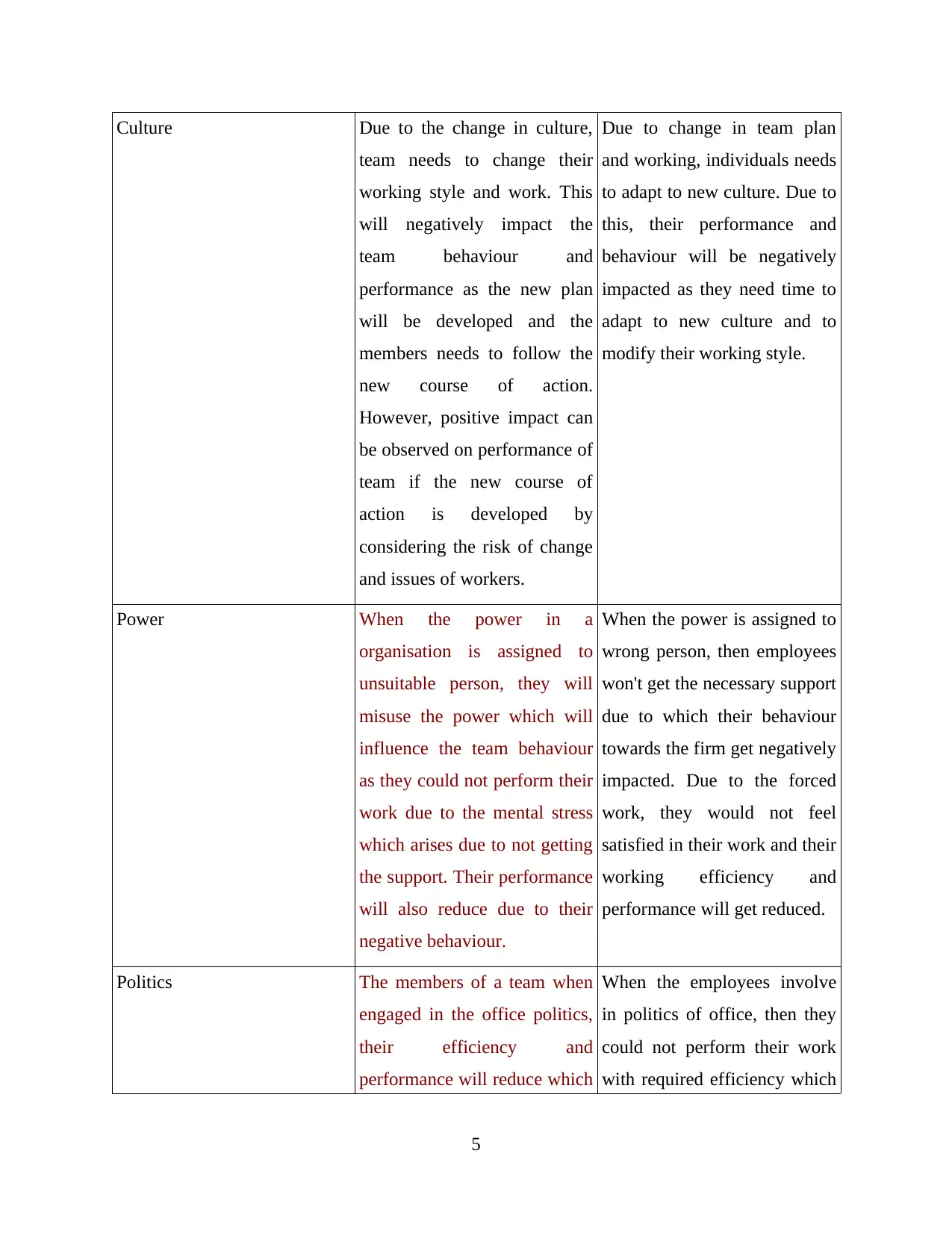
Culture Due to the change in culture,
team needs to change their
working style and work. This
will negatively impact the
team behaviour and
performance as the new plan
will be developed and the
members needs to follow the
new course of action.
However, positive impact can
be observed on performance of
team if the new course of
action is developed by
considering the risk of change
and issues of workers.
Due to change in team plan
and working, individuals needs
to adapt to new culture. Due to
this, their performance and
behaviour will be negatively
impacted as they need time to
adapt to new culture and to
modify their working style.
Power When the power in a
organisation is assigned to
unsuitable person, they will
misuse the power which will
influence the team behaviour
as they could not perform their
work due to the mental stress
which arises due to not getting
the support. Their performance
will also reduce due to their
negative behaviour.
When the power is assigned to
wrong person, then employees
won't get the necessary support
due to which their behaviour
towards the firm get negatively
impacted. Due to the forced
work, they would not feel
satisfied in their work and their
working efficiency and
performance will get reduced.
Politics The members of a team when
engaged in the office politics,
their efficiency and
performance will reduce which
When the employees involve
in politics of office, then they
could not perform their work
with required efficiency which
5
team needs to change their
working style and work. This
will negatively impact the
team behaviour and
performance as the new plan
will be developed and the
members needs to follow the
new course of action.
However, positive impact can
be observed on performance of
team if the new course of
action is developed by
considering the risk of change
and issues of workers.
Due to change in team plan
and working, individuals needs
to adapt to new culture. Due to
this, their performance and
behaviour will be negatively
impacted as they need time to
adapt to new culture and to
modify their working style.
Power When the power in a
organisation is assigned to
unsuitable person, they will
misuse the power which will
influence the team behaviour
as they could not perform their
work due to the mental stress
which arises due to not getting
the support. Their performance
will also reduce due to their
negative behaviour.
When the power is assigned to
wrong person, then employees
won't get the necessary support
due to which their behaviour
towards the firm get negatively
impacted. Due to the forced
work, they would not feel
satisfied in their work and their
working efficiency and
performance will get reduced.
Politics The members of a team when
engaged in the office politics,
their efficiency and
performance will reduce which
When the employees involve
in politics of office, then they
could not perform their work
with required efficiency which
5
Paraphrase This Document
Need a fresh take? Get an instant paraphrase of this document with our AI Paraphraser
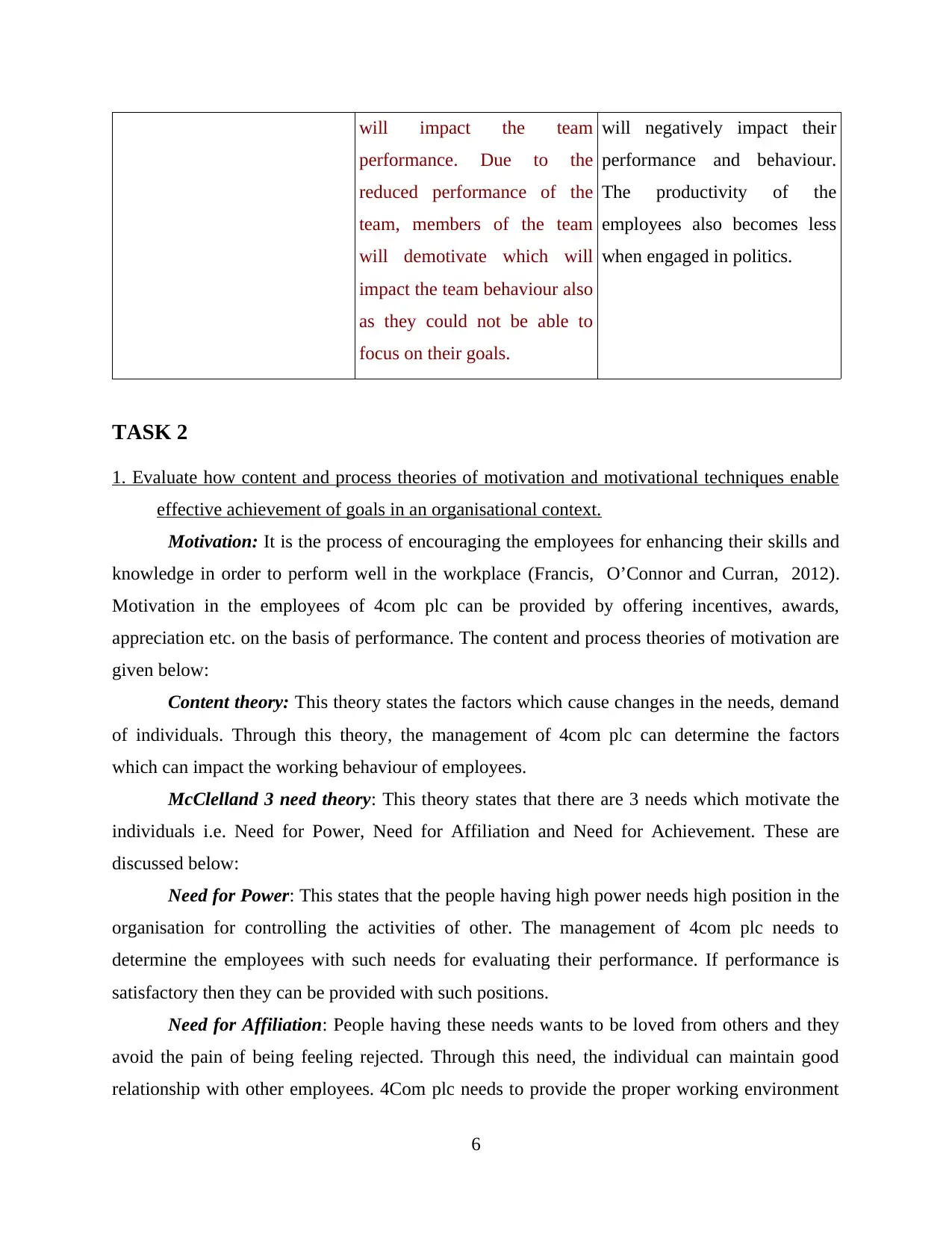
will impact the team
performance. Due to the
reduced performance of the
team, members of the team
will demotivate which will
impact the team behaviour also
as they could not be able to
focus on their goals.
will negatively impact their
performance and behaviour.
The productivity of the
employees also becomes less
when engaged in politics.
TASK 2
1. Evaluate how content and process theories of motivation and motivational techniques enable
effective achievement of goals in an organisational context.
Motivation: It is the process of encouraging the employees for enhancing their skills and
knowledge in order to perform well in the workplace (Francis, O’Connor and Curran, 2012).
Motivation in the employees of 4com plc can be provided by offering incentives, awards,
appreciation etc. on the basis of performance. The content and process theories of motivation are
given below:
Content theory: This theory states the factors which cause changes in the needs, demand
of individuals. Through this theory, the management of 4com plc can determine the factors
which can impact the working behaviour of employees.
McClelland 3 need theory: This theory states that there are 3 needs which motivate the
individuals i.e. Need for Power, Need for Affiliation and Need for Achievement. These are
discussed below:
Need for Power: This states that the people having high power needs high position in the
organisation for controlling the activities of other. The management of 4com plc needs to
determine the employees with such needs for evaluating their performance. If performance is
satisfactory then they can be provided with such positions.
Need for Affiliation: People having these needs wants to be loved from others and they
avoid the pain of being feeling rejected. Through this need, the individual can maintain good
relationship with other employees. 4Com plc needs to provide the proper working environment
6
performance. Due to the
reduced performance of the
team, members of the team
will demotivate which will
impact the team behaviour also
as they could not be able to
focus on their goals.
will negatively impact their
performance and behaviour.
The productivity of the
employees also becomes less
when engaged in politics.
TASK 2
1. Evaluate how content and process theories of motivation and motivational techniques enable
effective achievement of goals in an organisational context.
Motivation: It is the process of encouraging the employees for enhancing their skills and
knowledge in order to perform well in the workplace (Francis, O’Connor and Curran, 2012).
Motivation in the employees of 4com plc can be provided by offering incentives, awards,
appreciation etc. on the basis of performance. The content and process theories of motivation are
given below:
Content theory: This theory states the factors which cause changes in the needs, demand
of individuals. Through this theory, the management of 4com plc can determine the factors
which can impact the working behaviour of employees.
McClelland 3 need theory: This theory states that there are 3 needs which motivate the
individuals i.e. Need for Power, Need for Affiliation and Need for Achievement. These are
discussed below:
Need for Power: This states that the people having high power needs high position in the
organisation for controlling the activities of other. The management of 4com plc needs to
determine the employees with such needs for evaluating their performance. If performance is
satisfactory then they can be provided with such positions.
Need for Affiliation: People having these needs wants to be loved from others and they
avoid the pain of being feeling rejected. Through this need, the individual can maintain good
relationship with other employees. 4Com plc needs to provide the proper working environment
6
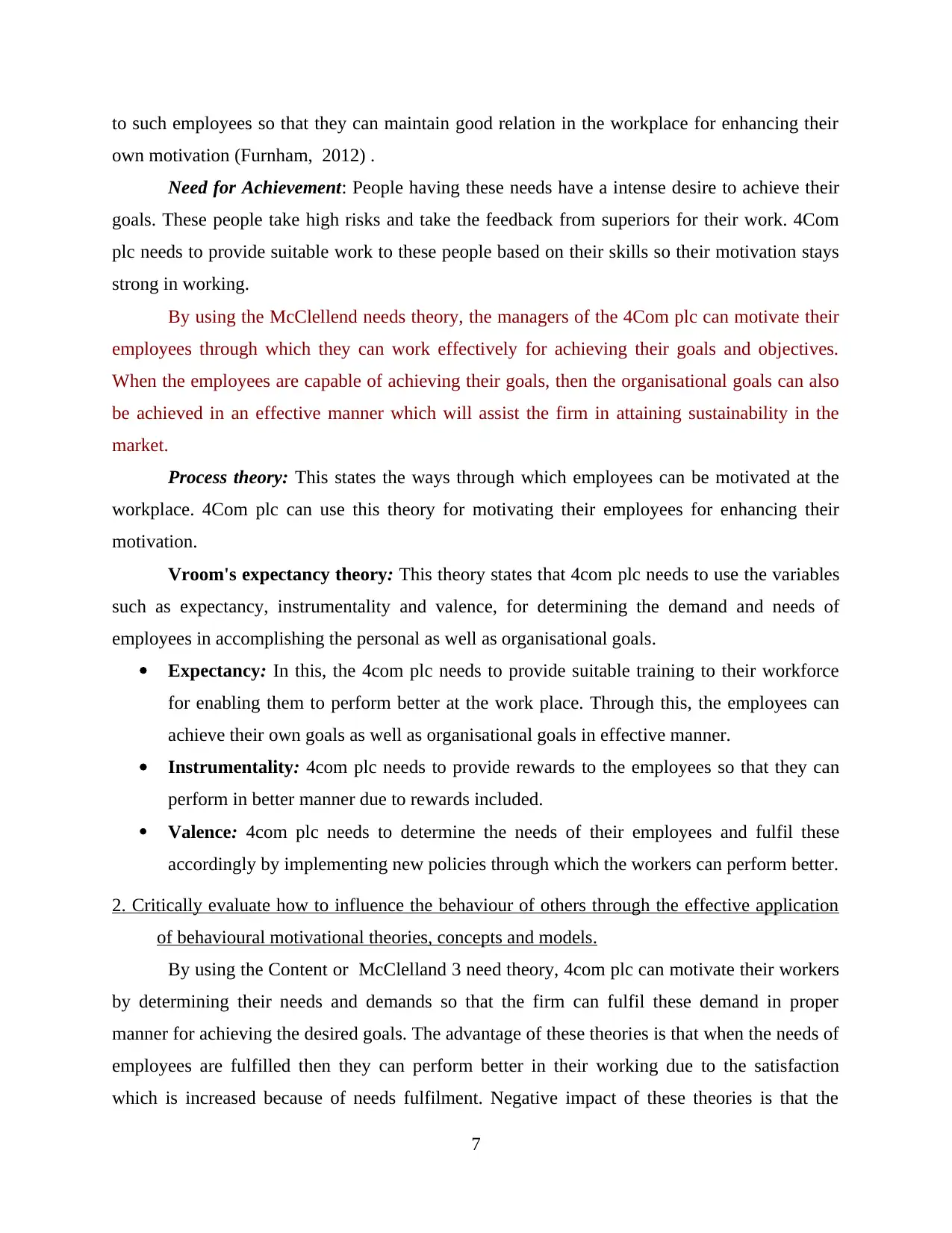
to such employees so that they can maintain good relation in the workplace for enhancing their
own motivation (Furnham, 2012) .
Need for Achievement: People having these needs have a intense desire to achieve their
goals. These people take high risks and take the feedback from superiors for their work. 4Com
plc needs to provide suitable work to these people based on their skills so their motivation stays
strong in working.
By using the McClellend needs theory, the managers of the 4Com plc can motivate their
employees through which they can work effectively for achieving their goals and objectives.
When the employees are capable of achieving their goals, then the organisational goals can also
be achieved in an effective manner which will assist the firm in attaining sustainability in the
market.
Process theory: This states the ways through which employees can be motivated at the
workplace. 4Com plc can use this theory for motivating their employees for enhancing their
motivation.
Vroom's expectancy theory: This theory states that 4com plc needs to use the variables
such as expectancy, instrumentality and valence, for determining the demand and needs of
employees in accomplishing the personal as well as organisational goals.
Expectancy: In this, the 4com plc needs to provide suitable training to their workforce
for enabling them to perform better at the work place. Through this, the employees can
achieve their own goals as well as organisational goals in effective manner.
Instrumentality: 4com plc needs to provide rewards to the employees so that they can
perform in better manner due to rewards included.
Valence: 4com plc needs to determine the needs of their employees and fulfil these
accordingly by implementing new policies through which the workers can perform better.
2. Critically evaluate how to influence the behaviour of others through the effective application
of behavioural motivational theories, concepts and models.
By using the Content or McClelland 3 need theory, 4com plc can motivate their workers
by determining their needs and demands so that the firm can fulfil these demand in proper
manner for achieving the desired goals. The advantage of these theories is that when the needs of
employees are fulfilled then they can perform better in their working due to the satisfaction
which is increased because of needs fulfilment. Negative impact of these theories is that the
7
own motivation (Furnham, 2012) .
Need for Achievement: People having these needs have a intense desire to achieve their
goals. These people take high risks and take the feedback from superiors for their work. 4Com
plc needs to provide suitable work to these people based on their skills so their motivation stays
strong in working.
By using the McClellend needs theory, the managers of the 4Com plc can motivate their
employees through which they can work effectively for achieving their goals and objectives.
When the employees are capable of achieving their goals, then the organisational goals can also
be achieved in an effective manner which will assist the firm in attaining sustainability in the
market.
Process theory: This states the ways through which employees can be motivated at the
workplace. 4Com plc can use this theory for motivating their employees for enhancing their
motivation.
Vroom's expectancy theory: This theory states that 4com plc needs to use the variables
such as expectancy, instrumentality and valence, for determining the demand and needs of
employees in accomplishing the personal as well as organisational goals.
Expectancy: In this, the 4com plc needs to provide suitable training to their workforce
for enabling them to perform better at the work place. Through this, the employees can
achieve their own goals as well as organisational goals in effective manner.
Instrumentality: 4com plc needs to provide rewards to the employees so that they can
perform in better manner due to rewards included.
Valence: 4com plc needs to determine the needs of their employees and fulfil these
accordingly by implementing new policies through which the workers can perform better.
2. Critically evaluate how to influence the behaviour of others through the effective application
of behavioural motivational theories, concepts and models.
By using the Content or McClelland 3 need theory, 4com plc can motivate their workers
by determining their needs and demands so that the firm can fulfil these demand in proper
manner for achieving the desired goals. The advantage of these theories is that when the needs of
employees are fulfilled then they can perform better in their working due to the satisfaction
which is increased because of needs fulfilment. Negative impact of these theories is that the
7
⊘ This is a preview!⊘
Do you want full access?
Subscribe today to unlock all pages.

Trusted by 1+ million students worldwide
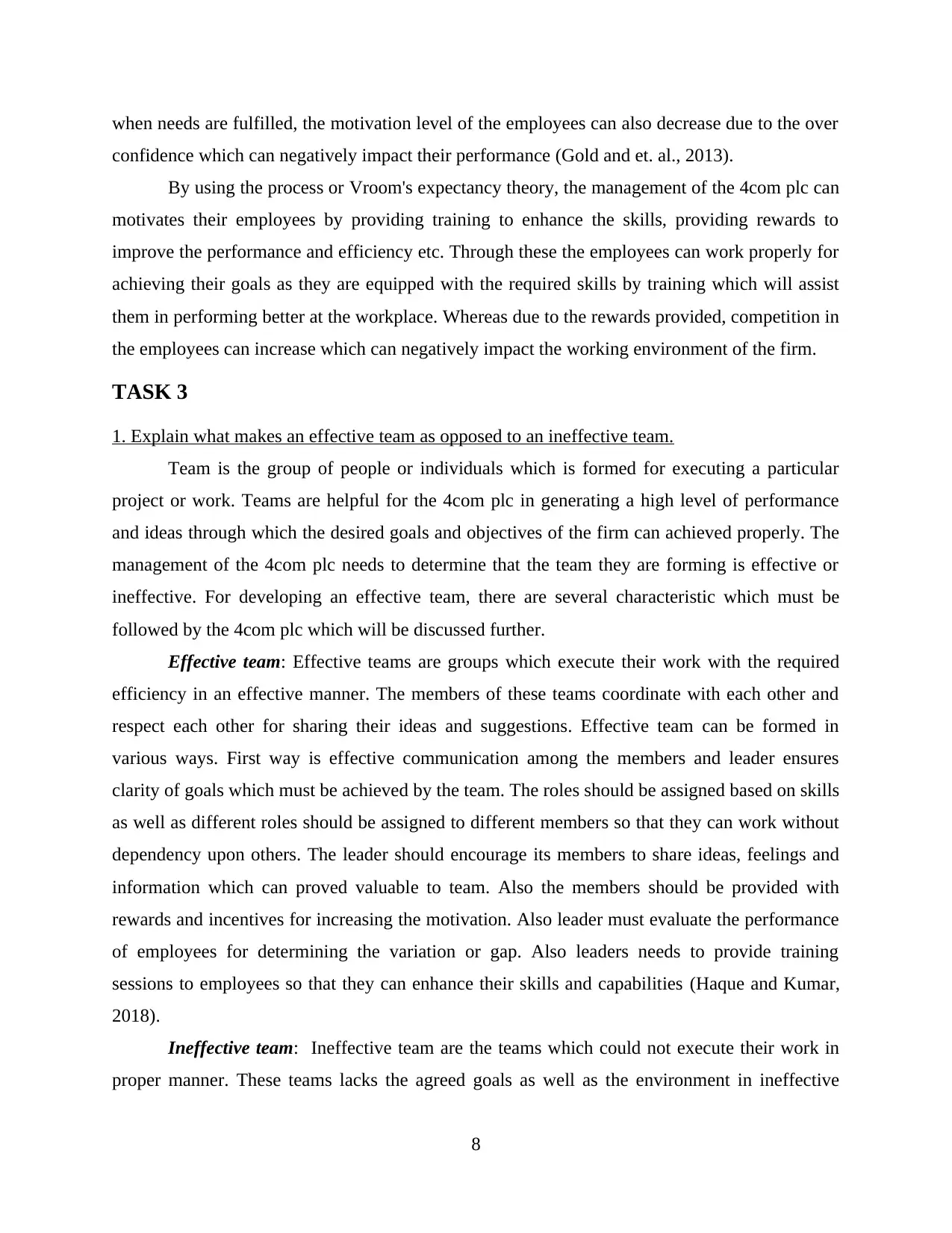
when needs are fulfilled, the motivation level of the employees can also decrease due to the over
confidence which can negatively impact their performance (Gold and et. al., 2013).
By using the process or Vroom's expectancy theory, the management of the 4com plc can
motivates their employees by providing training to enhance the skills, providing rewards to
improve the performance and efficiency etc. Through these the employees can work properly for
achieving their goals as they are equipped with the required skills by training which will assist
them in performing better at the workplace. Whereas due to the rewards provided, competition in
the employees can increase which can negatively impact the working environment of the firm.
TASK 3
1. Explain what makes an effective team as opposed to an ineffective team.
Team is the group of people or individuals which is formed for executing a particular
project or work. Teams are helpful for the 4com plc in generating a high level of performance
and ideas through which the desired goals and objectives of the firm can achieved properly. The
management of the 4com plc needs to determine that the team they are forming is effective or
ineffective. For developing an effective team, there are several characteristic which must be
followed by the 4com plc which will be discussed further.
Effective team: Effective teams are groups which execute their work with the required
efficiency in an effective manner. The members of these teams coordinate with each other and
respect each other for sharing their ideas and suggestions. Effective team can be formed in
various ways. First way is effective communication among the members and leader ensures
clarity of goals which must be achieved by the team. The roles should be assigned based on skills
as well as different roles should be assigned to different members so that they can work without
dependency upon others. The leader should encourage its members to share ideas, feelings and
information which can proved valuable to team. Also the members should be provided with
rewards and incentives for increasing the motivation. Also leader must evaluate the performance
of employees for determining the variation or gap. Also leaders needs to provide training
sessions to employees so that they can enhance their skills and capabilities (Haque and Kumar,
2018).
Ineffective team: Ineffective team are the teams which could not execute their work in
proper manner. These teams lacks the agreed goals as well as the environment in ineffective
8
confidence which can negatively impact their performance (Gold and et. al., 2013).
By using the process or Vroom's expectancy theory, the management of the 4com plc can
motivates their employees by providing training to enhance the skills, providing rewards to
improve the performance and efficiency etc. Through these the employees can work properly for
achieving their goals as they are equipped with the required skills by training which will assist
them in performing better at the workplace. Whereas due to the rewards provided, competition in
the employees can increase which can negatively impact the working environment of the firm.
TASK 3
1. Explain what makes an effective team as opposed to an ineffective team.
Team is the group of people or individuals which is formed for executing a particular
project or work. Teams are helpful for the 4com plc in generating a high level of performance
and ideas through which the desired goals and objectives of the firm can achieved properly. The
management of the 4com plc needs to determine that the team they are forming is effective or
ineffective. For developing an effective team, there are several characteristic which must be
followed by the 4com plc which will be discussed further.
Effective team: Effective teams are groups which execute their work with the required
efficiency in an effective manner. The members of these teams coordinate with each other and
respect each other for sharing their ideas and suggestions. Effective team can be formed in
various ways. First way is effective communication among the members and leader ensures
clarity of goals which must be achieved by the team. The roles should be assigned based on skills
as well as different roles should be assigned to different members so that they can work without
dependency upon others. The leader should encourage its members to share ideas, feelings and
information which can proved valuable to team. Also the members should be provided with
rewards and incentives for increasing the motivation. Also leader must evaluate the performance
of employees for determining the variation or gap. Also leaders needs to provide training
sessions to employees so that they can enhance their skills and capabilities (Haque and Kumar,
2018).
Ineffective team: Ineffective team are the teams which could not execute their work in
proper manner. These teams lacks the agreed goals as well as the environment in ineffective
8
Paraphrase This Document
Need a fresh take? Get an instant paraphrase of this document with our AI Paraphraser
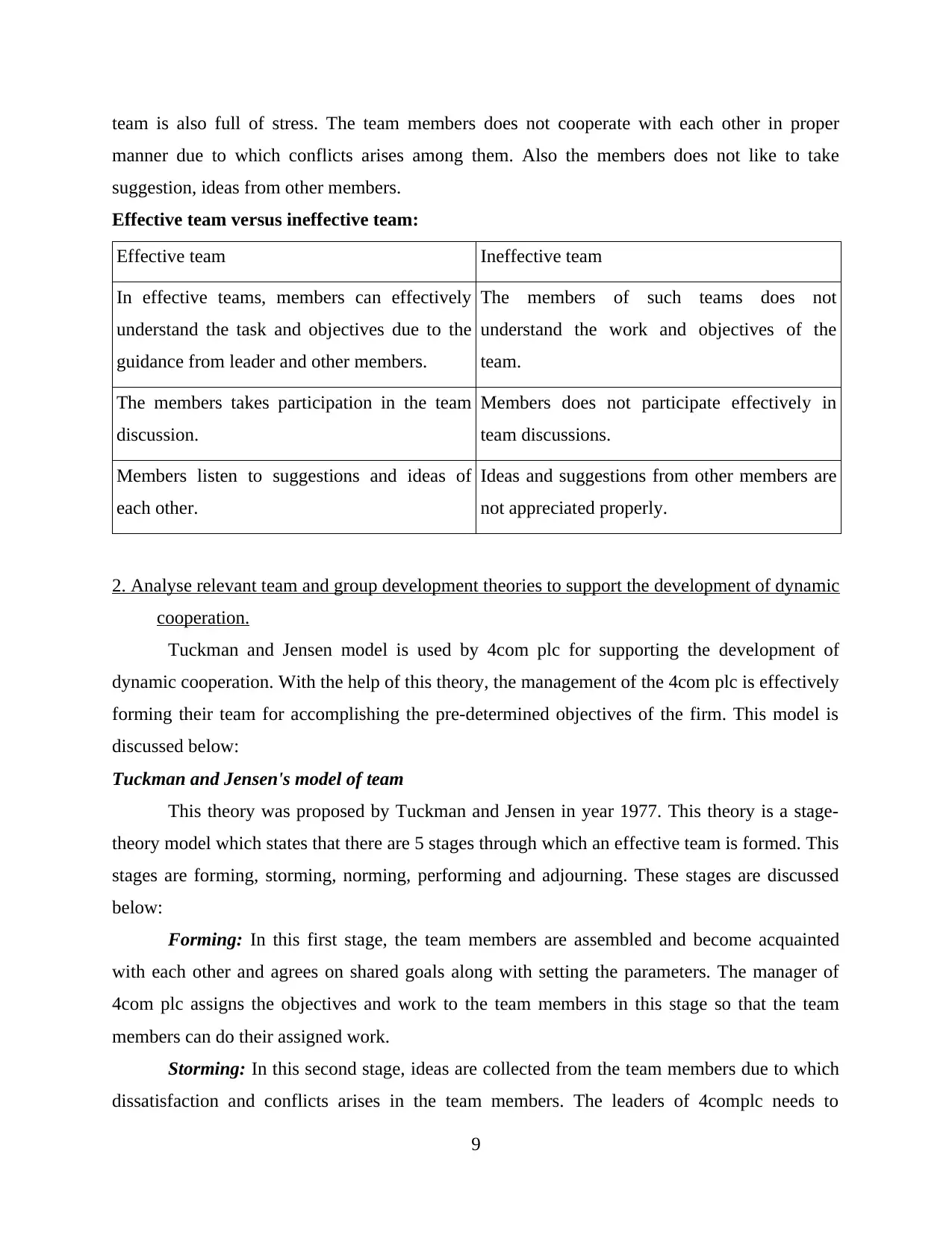
team is also full of stress. The team members does not cooperate with each other in proper
manner due to which conflicts arises among them. Also the members does not like to take
suggestion, ideas from other members.
Effective team versus ineffective team:
Effective team Ineffective team
In effective teams, members can effectively
understand the task and objectives due to the
guidance from leader and other members.
The members of such teams does not
understand the work and objectives of the
team.
The members takes participation in the team
discussion.
Members does not participate effectively in
team discussions.
Members listen to suggestions and ideas of
each other.
Ideas and suggestions from other members are
not appreciated properly.
2. Analyse relevant team and group development theories to support the development of dynamic
cooperation.
Tuckman and Jensen model is used by 4com plc for supporting the development of
dynamic cooperation. With the help of this theory, the management of the 4com plc is effectively
forming their team for accomplishing the pre-determined objectives of the firm. This model is
discussed below:
Tuckman and Jensen's model of team
This theory was proposed by Tuckman and Jensen in year 1977. This theory is a stage-
theory model which states that there are 5 stages through which an effective team is formed. This
stages are forming, storming, norming, performing and adjourning. These stages are discussed
below:
Forming: In this first stage, the team members are assembled and become acquainted
with each other and agrees on shared goals along with setting the parameters. The manager of
4com plc assigns the objectives and work to the team members in this stage so that the team
members can do their assigned work.
Storming: In this second stage, ideas are collected from the team members due to which
dissatisfaction and conflicts arises in the team members. The leaders of 4complc needs to
9
manner due to which conflicts arises among them. Also the members does not like to take
suggestion, ideas from other members.
Effective team versus ineffective team:
Effective team Ineffective team
In effective teams, members can effectively
understand the task and objectives due to the
guidance from leader and other members.
The members of such teams does not
understand the work and objectives of the
team.
The members takes participation in the team
discussion.
Members does not participate effectively in
team discussions.
Members listen to suggestions and ideas of
each other.
Ideas and suggestions from other members are
not appreciated properly.
2. Analyse relevant team and group development theories to support the development of dynamic
cooperation.
Tuckman and Jensen model is used by 4com plc for supporting the development of
dynamic cooperation. With the help of this theory, the management of the 4com plc is effectively
forming their team for accomplishing the pre-determined objectives of the firm. This model is
discussed below:
Tuckman and Jensen's model of team
This theory was proposed by Tuckman and Jensen in year 1977. This theory is a stage-
theory model which states that there are 5 stages through which an effective team is formed. This
stages are forming, storming, norming, performing and adjourning. These stages are discussed
below:
Forming: In this first stage, the team members are assembled and become acquainted
with each other and agrees on shared goals along with setting the parameters. The manager of
4com plc assigns the objectives and work to the team members in this stage so that the team
members can do their assigned work.
Storming: In this second stage, ideas are collected from the team members due to which
dissatisfaction and conflicts arises in the team members. The leaders of 4complc needs to
9
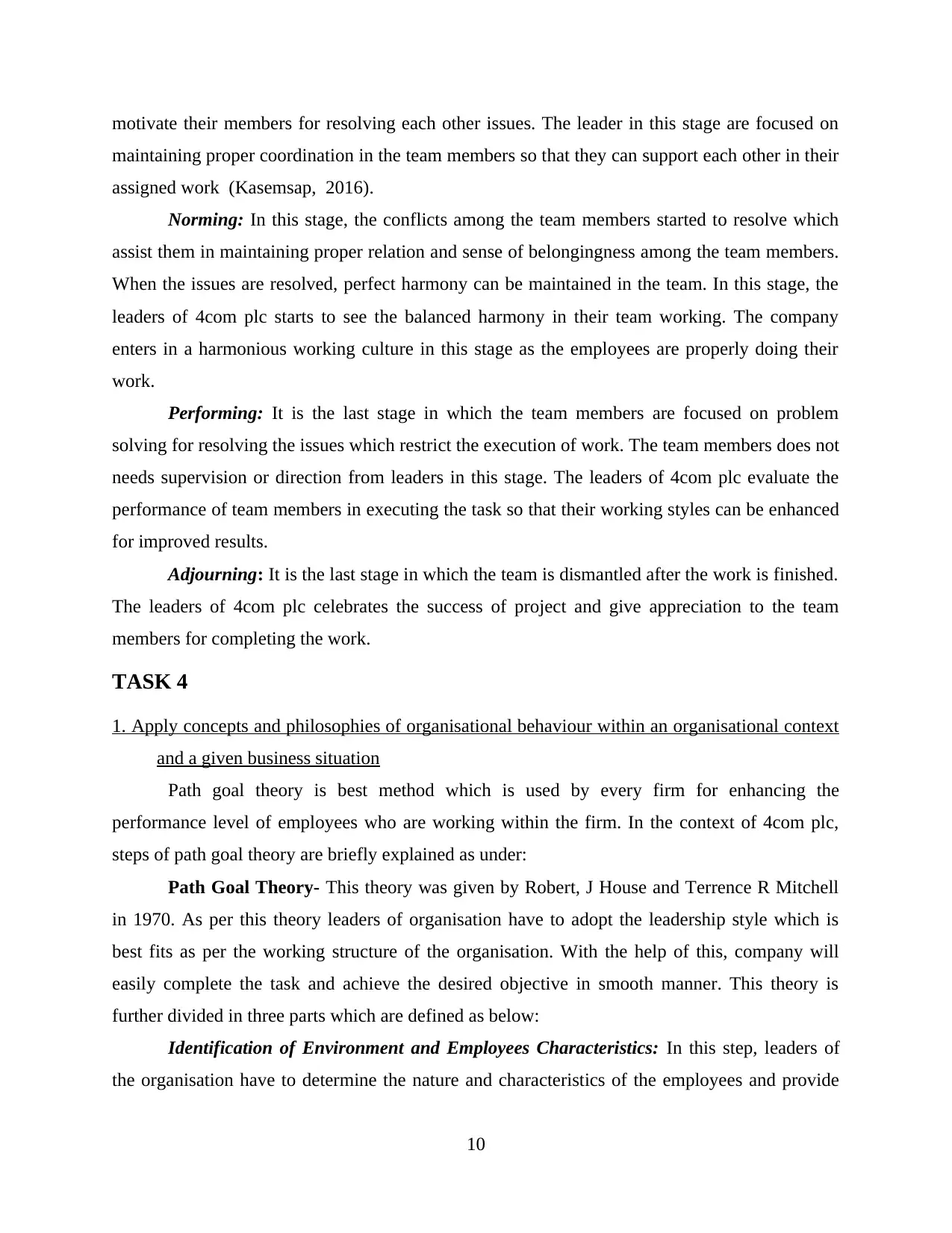
motivate their members for resolving each other issues. The leader in this stage are focused on
maintaining proper coordination in the team members so that they can support each other in their
assigned work (Kasemsap, 2016).
Norming: In this stage, the conflicts among the team members started to resolve which
assist them in maintaining proper relation and sense of belongingness among the team members.
When the issues are resolved, perfect harmony can be maintained in the team. In this stage, the
leaders of 4com plc starts to see the balanced harmony in their team working. The company
enters in a harmonious working culture in this stage as the employees are properly doing their
work.
Performing: It is the last stage in which the team members are focused on problem
solving for resolving the issues which restrict the execution of work. The team members does not
needs supervision or direction from leaders in this stage. The leaders of 4com plc evaluate the
performance of team members in executing the task so that their working styles can be enhanced
for improved results.
Adjourning: It is the last stage in which the team is dismantled after the work is finished.
The leaders of 4com plc celebrates the success of project and give appreciation to the team
members for completing the work.
TASK 4
1. Apply concepts and philosophies of organisational behaviour within an organisational context
and a given business situation
Path goal theory is best method which is used by every firm for enhancing the
performance level of employees who are working within the firm. In the context of 4com plc,
steps of path goal theory are briefly explained as under:
Path Goal Theory- This theory was given by Robert, J House and Terrence R Mitchell
in 1970. As per this theory leaders of organisation have to adopt the leadership style which is
best fits as per the working structure of the organisation. With the help of this, company will
easily complete the task and achieve the desired objective in smooth manner. This theory is
further divided in three parts which are defined as below:
Identification of Environment and Employees Characteristics: In this step, leaders of
the organisation have to determine the nature and characteristics of the employees and provide
10
maintaining proper coordination in the team members so that they can support each other in their
assigned work (Kasemsap, 2016).
Norming: In this stage, the conflicts among the team members started to resolve which
assist them in maintaining proper relation and sense of belongingness among the team members.
When the issues are resolved, perfect harmony can be maintained in the team. In this stage, the
leaders of 4com plc starts to see the balanced harmony in their team working. The company
enters in a harmonious working culture in this stage as the employees are properly doing their
work.
Performing: It is the last stage in which the team members are focused on problem
solving for resolving the issues which restrict the execution of work. The team members does not
needs supervision or direction from leaders in this stage. The leaders of 4com plc evaluate the
performance of team members in executing the task so that their working styles can be enhanced
for improved results.
Adjourning: It is the last stage in which the team is dismantled after the work is finished.
The leaders of 4com plc celebrates the success of project and give appreciation to the team
members for completing the work.
TASK 4
1. Apply concepts and philosophies of organisational behaviour within an organisational context
and a given business situation
Path goal theory is best method which is used by every firm for enhancing the
performance level of employees who are working within the firm. In the context of 4com plc,
steps of path goal theory are briefly explained as under:
Path Goal Theory- This theory was given by Robert, J House and Terrence R Mitchell
in 1970. As per this theory leaders of organisation have to adopt the leadership style which is
best fits as per the working structure of the organisation. With the help of this, company will
easily complete the task and achieve the desired objective in smooth manner. This theory is
further divided in three parts which are defined as below:
Identification of Environment and Employees Characteristics: In this step, leaders of
the organisation have to determine the nature and characteristics of the employees and provide
10
⊘ This is a preview!⊘
Do you want full access?
Subscribe today to unlock all pages.

Trusted by 1+ million students worldwide
1 out of 15
Related Documents
Your All-in-One AI-Powered Toolkit for Academic Success.
+13062052269
info@desklib.com
Available 24*7 on WhatsApp / Email
![[object Object]](/_next/static/media/star-bottom.7253800d.svg)
Unlock your academic potential
Copyright © 2020–2026 A2Z Services. All Rights Reserved. Developed and managed by ZUCOL.



